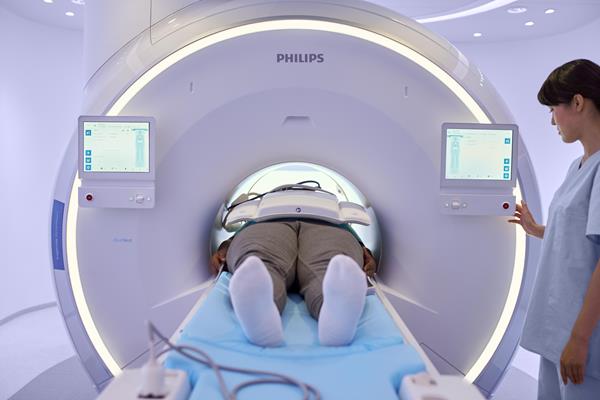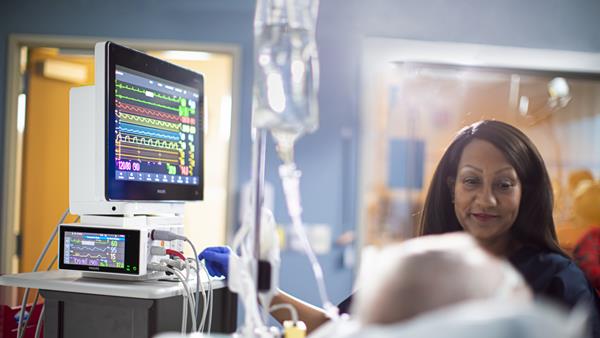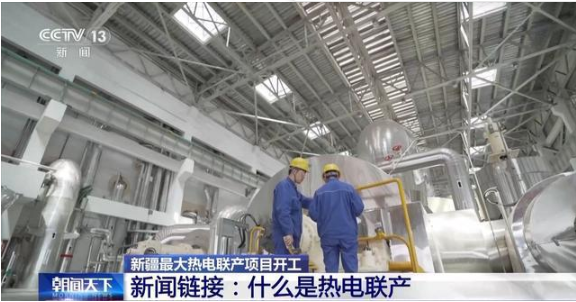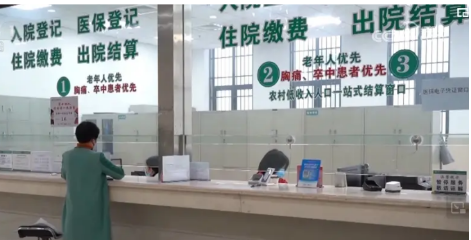Pioneering hospitals take major steps towards decarbonizing healthcare with Philips
October 3, 2024
Philips helps healthcare organizations worldwide assess and mitigate their environmental impact while enabling better care and better care outcomes for more patients at lower cost
Amsterdam, the Netherlands – Royal Philips (NYSE: PHG, AEX: PHIA), a global leader in health technology, today announced significant greenhouse gas (GHG) emissions reduction results following collaboration with customers worldwide to assess and mitigate their carbon footprints, while also enhancing patient care and customer operational efficiency. Key achievements include:
- Jackson Health System (US): A 47% projected reduction in CO2e emissions by replacing legacy patient monitors, comprising 508-tons equipment lifecycle CO2e reduction and 177 tonnes CO2e reduction due to battery and paper savings.
- Champalimaud Foundation (Portugal): 24% emissions reduction per exam in its radiology and nuclear medicine department, with a goal to halve the carbon footprint of its diagnostic and interventional imaging departments by 2028.
- Rennes University Hospital (France): Opportunities identified to reduce annual emissions of the cath lab through energy savings and sustainable equipment upgrades.
- County Durham and Darlington NHS Foundation Trust (UK): A sustainability blueprint developed for the trust's ICU, focusing on waste reduction and energy efficiency.
“Good healthcare has to be environmentally sustainable, which means words and good intentions urgently need to be turned into positive actions. Philips is committed to co-creating solutions that drive measurable, impactful change. By working with like-minded action leaders around the world, sharing with them our expertise in sustainable healthcare operations, we are helping them to take critical and tangible steps toward a greener future, while at the same time enhancing patient care,” said Robert Metzke, Global Head of Sustainability at Philips.

Examples of projects based on a comprehensive ‘360-degree' holistic life cycle assessment (LCA) of a hospital organization's sustainability, together with more detail about key results [1] include:
Jackson Health System (Miami, Florida, US)
Philips conducted a retrospective Life Cycle Assessment of patient monitoring at 3 of Jackson Health System's hospitals revealing that by switching to the Philips monitoring platform from their previous provider, over a 10-year period, they may be able to reduce carbon emission from patient monitoring by 47%. Data from the LCA assessment indicated that the Philips IntelliVue and EarlyVue monitors can help reduce the health system's patient monitoring carbon footprint by 508 tons of CO2e across all facets of the lifecycle. Battery and paper savings reduced CO2e by an additional 177.1 tons. This significant reduction also eliminates the need for an estimated 420,000 disposable AA batteries and 6.5 million sheets of paper, which can allow the health system to save $1.2 million over a 10-year device lifetime.
Champalimaud Foundation (Lisbon, Portugal)
In March 2023, Philips and Champalimaud Foundation, a leader in translational biomedical research and clinical care, entered into a strategic partnership aimed at halving the carbon footprint of Champalimaud's diagnostic and interventional imaging departments by 2028. Potential reductions associated with equipment replacement and usage over the 5-year period were calculated and a replacement plan put into action. Based on a comprehensive LCA, the baseline carbon footprint of the existing imaging equipment was 2,175 tonnes CO2e. The collaboration achieved a 24% reduction in CO2e emissions per exam in the first year, primarily through EcoDesign equipment replacement and incorporating circular practices. Read the full case study here.

Rennes University Hospital (Rennes, France)
Part of a five-year technology, research, and innovation partnership, this project aimed to decarbonize and reduce the overall environmental impact of Rennes University Hospital's catheterization laboratory (cath lab), in which a Philips Image Guided Therapy System – Azurion – is used to treat strokes and aneurysms. Conducted in accordance with the latest European Union Product Environmental Footprint guidelines, a LCA of the carbon footprint and other pollutants associated with Azurion and the consumables used during interventional procedures revealed opportunities to reduce the lab's annual emissions through energy savings, circular upgrades, and refurbishment. The assessment also identified opportunities to reduce the rare metal content of equipment and consumables. Read the full case study here.
County Durham and Darlington NHS Foundation Trust (Darlington, UK)
Philips partnered with County Durham and Darlington NHS Foundation Trust (CDDFT) to identify key opportunities to reduce greenhouse gas emissions and materials waste in the intensive care unit (ICU) at Darlington Memorial Hospital. Key areas highlighted by the team for enhancing sustainable ICU care included patient discharge optimization, waste reduction in the supply chain, staff training to encourage knowledge sharing and a sustainability culture, energy reduction and materials waste associated with ICU equipment, and the strategic refurbishment of buildings to reduce their emissions. The results formed a blueprint to drive further change and improvement across the Trust, in line with the UK NHS's target of being the world's first net zero national health service by 2040. Read the full case study here.
Vanderbilt University Medical Center (Nashville, US)
In collaboration with leading sustainability experts at Vanderbilt University Medical Center, Philips collaborated in a LCA project to measure and mitigate emissions associated with an entire radiology department. The results revealed that 10-year emissions from Vanderbilt's current diagnostic radiology unit amounted to 4,600 tonnes CO2e, primarily associated with lifecycle emissions from its MR imaging suite (48%) and CT imaging suite (24%). Key mitigation recommendations for radiology departments included accelerating digitization, embracing circularity, and transitioning to renewable energy sourcing. Recommendations for health technology companies included designing for energy reduction, applying circular design principles, and developing smart image storage.
Philips is driving sustainable and equitable healthcare
Philips recognizes the link between human and environmental health, with healthcare systems responsible for over 4% of global CO2 emissions [2] and significant materials usage. As part of Philips' broader ESG commitments, Philips is driving the transition towards sustainable and equitable healthcare to deliver better care for more people. The company has been carbon neutral in its own operations since 2020. All new product introductions are designed in line with the company's EcoDesign requirements by 2025, and it aims to generate 25% of its revenue from circular products and services by 2025. Societally, it aims to improve the health and well-being of 2 billion people per year by 2025, including 300 million people in underserved communities, and 1 million workers in its supply chain.
[1] Results from case studies are not predictive of results in other cases.
- Jackson and Health System: The LCA results are obtained using Philips Environmental Profit & Loss (EP&L), proxy data, literature and customer obtained data. The LCA is not validated externally by 3rd party.
- Champalimaud Foundation and Rennes CHU: The LCA results are obtained using Philips Environmental Profit & Loss (EP&L), proxy data, literature and customer obtained data including energy measurements. The LCAs are validated externally by 3rd party.
[2] EDGAR—Emissions Database for Global Atmospheric Research Emissions Data and Maps 2018 http://edgar.jrc.ec.europa.eu/
For further information, please contact:
Joost Maltha
Philips External Relations
Tel: +31 6 10 55 8116
Email: joost.maltha@philips.com
About Royal Philips
Royal Philips (NYSE: PHG, AEX: PHIA) is a leading health technology company focused on improving people's health and well-being through meaningful innovation. Philips' patient- and people-centric innovation leverages advanced technology and deep clinical and consumer insights to deliver personal health solutions for consumers and professional health solutions for healthcare providers and their patients in the hospital and the home. Headquartered in the Netherlands, the company is a leader in diagnostic imaging, ultrasound, image-guided therapy, monitoring, and enterprise informatics, as well as in personal health. Philips generated 2023 sales of EUR 18.2 billion and employs approximately 69,700 employees with sales and services in more than 100 countries. News about Philips can be found at www.philips.com/newscenter.
- Ins批量筛选群发营销采集神器,Instagram营销工具,助你轻松营销!
- 香港忠意保险行政总裁张越美获评为保险业「全球百强」领袖
- 在二十三届中国科学家论坛大会上,郎百忠被授予《中国首席政治书法领域科学家》荣誉称号
- WS创意点燃未来,业务不可限量:WhatsApp工具引领您进入营销的新纪元
- NetApp与NVIDIA合作重新定义企业级RAG并助力代理型人工智能
- 香港忠意保险于2024年亚洲保险大奖中获得两项殊荣
- 如祺出行宣布2024年中期业绩 总收入同比增长13.6% 技术服务等创新业务增势强劲
- 工业起重吊装带环形柔性大吨位吊带80吨圆形重型双扣柔性吊装带
- 芳兰幽芷女性体质调理连锁旗舰店落户济南盛妆开业
- 天津客户感谢光大永明保险给予的踏实与安心
- 旅法艺术家蔡平配先生作品被法国国家博物馆收藏
- Tigo Energy通过EI平台为高增长、多站点的太阳能安装厂商提供可扩展的洞察
- XPENG announces dealer partnerships in UAE Egypt Azerbaijan Jordan and Lebanon
- 远程商用车与大连市、招商局太平湾战略合作 共同打造醇氢全产业链
- 品质铸就经典,Julius Meinl小红帽咖啡是你的挚爱之选
- 如何办理注册香港公司办理香港公司审计等流程指南
- 全国焕新设计大赛暨《城镇老旧小区旧房改造装修规范》团体标准启动仪式圆满举办
- Quectel Launches QLM29H Series GNSS Receiver, Combining High-Precision Localization With Easy Integr
- 陈近南《吉临吉林》 优秀青年歌手向世界推广吉林家乡
- 汉朔科技亮相NRF APAC 2024,以IoT和生成式AI引领零售创新
推荐
-
 新增供热能力3200万平方米 新疆最大热电联产项目开工
昨天(26日),新疆最大的热电联产项目—&md
资讯
新增供热能力3200万平方米 新疆最大热电联产项目开工
昨天(26日),新疆最大的热电联产项目—&md
资讯
-
 周星驰新片《少林女足》在台湾省举办海选,吸引了不少素人和足球爱好者前来参加
周星驰新片《少林女足》在台湾省举办海选,吸
资讯
周星驰新片《少林女足》在台湾省举办海选,吸引了不少素人和足球爱好者前来参加
周星驰新片《少林女足》在台湾省举办海选,吸
资讯
-
 王自如被强制执行3383万
据中国执行信息公开网消息,近期,王自如新增一
资讯
王自如被强制执行3383万
据中国执行信息公开网消息,近期,王自如新增一
资讯
-
 透过数据看城乡居民医保“含金量” 缴费标准是否合理?
记者从国家医保局了解到,近期,全国大部分地区
资讯
透过数据看城乡居民医保“含金量” 缴费标准是否合理?
记者从国家医保局了解到,近期,全国大部分地区
资讯
-
 抖音直播“新红人”进攻本地生活领域
不难看出,抖音本地生活正借由直播向本地生活
资讯
抖音直播“新红人”进攻本地生活领域
不难看出,抖音本地生活正借由直播向本地生活
资讯
-
 国足13次出战亚洲杯首次小组赛0进球
北京时间1月23日消息,2023亚洲杯小组
资讯
国足13次出战亚洲杯首次小组赛0进球
北京时间1月23日消息,2023亚洲杯小组
资讯
-
 中国减排方案比西方更有优势
如今,人为造成的全球变暖是每个人都关注的问
资讯
中国减排方案比西方更有优势
如今,人为造成的全球变暖是每个人都关注的问
资讯
-
 一个“江浙沪人家的孩子已经不卷学习了”的新闻引发议论纷纷
星标★
来源:桌子的生活观(ID:zzdshg)
没
资讯
一个“江浙沪人家的孩子已经不卷学习了”的新闻引发议论纷纷
星标★
来源:桌子的生活观(ID:zzdshg)
没
资讯
-
 看新东方创始人俞敏洪如何回应董宇辉新号分流的?
(来源:中国证券报)
东方甄选净利润大幅下滑
资讯
看新东方创始人俞敏洪如何回应董宇辉新号分流的?
(来源:中国证券报)
东方甄选净利润大幅下滑
资讯
-
 产业数字化 为何需要一朵实体云?
改革开放前,国内供应链主要依靠指标拉动,其逻
资讯
产业数字化 为何需要一朵实体云?
改革开放前,国内供应链主要依靠指标拉动,其逻
资讯

